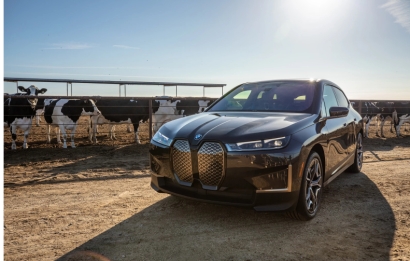
The collaboration – recognized by ABC for breaking new ground in the U.S. biogas industry and across the global energy landscape – is the first to use renewable biogas to make electricity from fuel cells to power an onsite microgrid and a fleet of electric vehicles (EVs).
This installation addresses the challenges dairy biogas poses to the atmosphere, as this waste contains up to 65 percent methane, and turns what would otherwise be a waste product into clean energy. Bloom Energy and CalBio combined a methane digester, gas clean-up skid, and Bloom Energy’s pioneering, non-combustion fuel cell technology, to provide Bar 20 with an end-to-end, waste-to-electricity solution. This solution captures the methane that would otherwise be released into the atmosphere in the process of generating clean, on-site power with a negative carbon intensity score.
“We are honored to have our work in this space recognized by the American Biogas Council and Innovation Center for U.S. Dairy, as this project with CalBio and Bar 20 Dairy Farms exemplifies Bloom’s capabilities for creating abundant, clean energy that can scale to meet the needs of both urban and rural areas,” said Chuck Moesta, VP Gas Management at Bloom Energy. “Fuel cells are playing a pivotal role in addressing climate change, and the fuel flexibility of the Bloom Energy Server enables operations of all sizes to make smart decisions about how they get their power – and in the case of biogas, we enable the ability of a closed loop, clean energy system.”
“It is an honor to recognize Bloom Energy and CalBio for breaking new ground as the first to use renewable biogas to make electricity from fuel cells to power an onsite microgrid and a fleet of electric vehicles,” said Patrick Serfass, executive director of ABC. “They are shining example of the innovative spirit that is powering the massive growth of biogas in America and globally, as well as the commitment to solving complex energy and environmental challenges with sustainable solutions that benefit us all.”
At Bar 20, Bloom’s Energy Servers are designed to generate enough electricity with the supply of onsite biogas to operate the gas clean-up skid, to meet the farm’s energy needs, and to send excess power back to the grid to deploy to EV charging stations across California. This model can be replicated at dairy farms across the country, providing farms energy and cost resiliency. Dairy farms that provide renewable electricity to charge EVs in California, as Bar 20 is doing, can participate in the California Air Resources Board’s Low Carbon Fuel Standard program, providing a new income opportunity for farmers while also reducing greenhouse gas emissions.
Biogas from California’s dairy farms has the potential to generate 300MW+ of power, equivalent to powering approximately 600,000 EVs, each traveling 15,000 miles per year.

